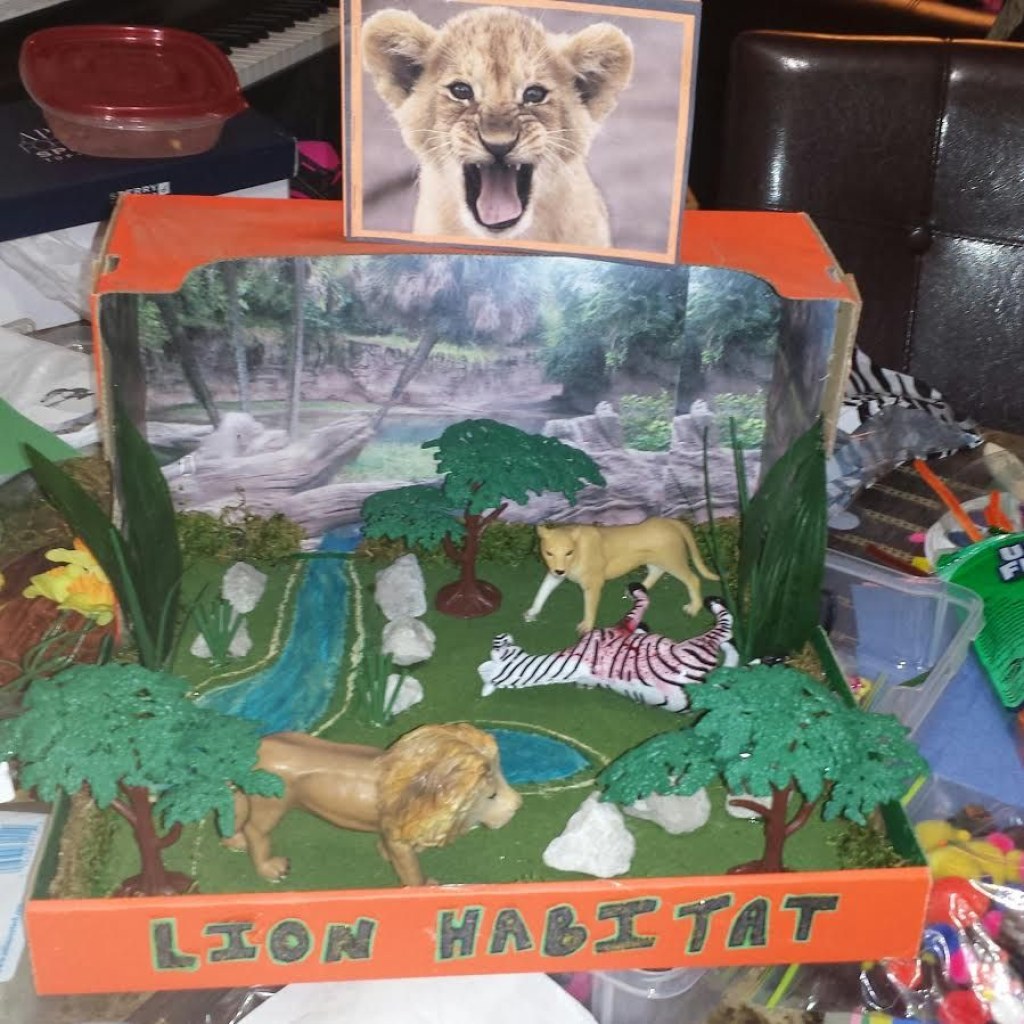Roaring Lion Habitat Project Ideas: Ignite Your Passion And Take Action Now!
Lion Habitat Project Ideas
Introduction
Good People, welcome to this article that aims to provide you with useful information about lion habitat project ideas. Lions are majestic creatures that play a vital role in our ecosystem. However, their habitats are constantly being threatened, leading to a decline in their population. In order to preserve these magnificent animals, it is crucial to implement habitat projects that promote their well-being and conservation.
2 Picture Gallery: Roaring Lion Habitat Project Ideas: Ignite Your Passion And Take Action Now!


In this article, we will explore various ideas for lion habitat projects, discussing their benefits, challenges, and how they can make a difference. So, let’s dive in and discover the exciting world of lion habitat projects!
What are Lion Habitat Projects?

Image Source: pinimg.com
🦁 Lion habitat projects are initiatives designed to create and maintain suitable environments for lions to thrive in. These projects encompass a range of activities, such as habitat restoration, community engagement, and wildlife conservation efforts.
Lions require vast territories to hunt, breed, and establish their dominance. However, due to factors like human encroachment, habitat fragmentation, and poaching, lions often face challenges in finding suitable spaces to fulfill their ecological needs.

Image Source: pinimg.com
By implementing lion habitat projects, we can ensure the preservation of lion populations and contribute to the overall biodiversity of our planet.
Who Can Undertake Lion Habitat Projects?
🌍 Lion habitat projects can be undertaken by various stakeholders, including governments, non-profit organizations, conservation groups, and concerned individuals. Collaboration between these entities is crucial to achieve long-term success in preserving lion habitats.
Additionally, local communities living near lion habitats can play a significant role in the success of these projects. Involving them in decision-making processes, education, and sustainable livelihood initiatives can create a sense of ownership and foster a positive relationship between humans and lions.
When Should Lion Habitat Projects Take Place?
⏰ Lion habitat projects should be ongoing efforts that are not bound by time constraints. However, there are certain periods that may be more favorable for implementing specific activities within these projects.
For example, habitat restoration activities such as reforestation and water resource management can be carried out during the rainy seasons when the land is more receptive to these interventions. Other activities like community engagement programs and educational campaigns can be conducted throughout the year to raise awareness and garner support.
Where Should Lion Habitat Projects Be Implemented?
📍 Lion habitat projects should be implemented in areas that are currently inhabited by lions or have the potential to support lion populations. This includes national parks, wildlife reserves, and other protected areas.
Identifying key lion habitats and creating corridors that connect fragmented areas can aid in expanding their range and promoting genetic diversity. It is vital to work closely with local authorities and conservation experts to select suitable locations for these projects.
Why Are Lion Habitat Projects Important?
🌿 Lion habitat projects are crucial for the survival of these majestic creatures and the overall health of our ecosystems. Here are some reasons why these projects are important:
1. Conservation of Biodiversity: Lions are keystone species, playing a vital role in maintaining the balance of their ecosystems. By conserving their habitats, we protect countless other species that depend on these ecosystems for survival.
2. Protection of Ecosystem Services: Lions contribute to ecosystem services such as controlling herbivore populations, promoting vegetation growth, and ensuring ecological stability. Preserving their habitats ensures the continuity of these services.
3. Sustainable Tourism and Economic Benefits: Lions attract tourists from around the world, boosting local economies and providing livelihood opportunities for communities near their habitats.
4. Cultural and Symbolic Significance: Lions hold cultural and symbolic value in many societies. By protecting their habitats, we preserve these cultural connections and traditions.
5. Education and Awareness: Lion habitat projects provide opportunities for education and awareness about wildlife conservation, inspiring future generations to protect our natural heritage.
How Can Lion Habitat Projects Be Implemented?
🔧 Implementing lion habitat projects requires careful planning, cooperation, and adequate resources. Here are some steps to consider when implementing these projects:
1. Research and Assessment: Conduct thorough research and assessments to gather information about lion populations, habitats, and the challenges they face.
2. Collaboration and Partnerships: Engage with relevant stakeholders, such as local communities, conservation organizations, and government agencies, to establish partnerships and secure support.
3. Habitat Restoration: Carry out activities like reforestation, water resource management, and invasive species control to restore and enhance lion habitats.
4. Community Engagement: Involve local communities in decision-making processes, provide education and awareness programs, and create sustainable livelihood opportunities that benefit both humans and lions.
5. Anti-Poaching Measures: Implement robust anti-poaching strategies, including increased patrolling, intelligence gathering, and collaboration with law enforcement agencies.
6. Monitoring and Evaluation: Regularly monitor the progress and impact of the habitat projects to ensure their effectiveness and make necessary adjustments.
Pros and Cons of Lion Habitat Projects
Pros:
1. Conservation of lion populations and biodiversity.
2. Protection of ecosystem services and ecological balance.
3. Sustainable tourism and economic benefits.
4. Preservation of cultural and symbolic values.
5. Education and awareness about wildlife conservation.
Cons:
1. Financial and resource-intensive.
2. Requires long-term commitment and cooperation.
3. Potential conflicts with local communities and economic interests.
4. Limited success without adequate anti-poaching measures.
5. Challenges in maintaining habitat connectivity and genetic diversity.
Frequently Asked Questions (FAQ)
Q: What is the cost of implementing a lion habitat project?
A: The cost of implementing a lion habitat project can vary depending on various factors such as project scope, location, and duration. It involves expenses for research, habitat restoration, community engagement, anti-poaching measures, and ongoing monitoring.
Q: How can I contribute to lion habitat projects?
A: You can contribute to lion habitat projects by supporting reputable conservation organizations, participating in volunteer programs, spreading awareness about the importance of lion conservation, and avoiding products derived from illegal wildlife trade.
Q: Do lion habitat projects only focus on protecting lions?
A: No, lion habitat projects aim to protect the entire ecosystem by conserving lion populations and their habitats. This indirectly benefits numerous other species and ensures the ecological balance of the area.
Q: What are the biggest challenges in implementing lion habitat projects?
A: Some of the biggest challenges in implementing lion habitat projects include securing sufficient funding and resources, addressing conflicts with local communities, combating poaching activities, and maintaining long-term commitment and cooperation among stakeholders.
Q: Can lion habitat projects be replicated for other big cat species?
A: Yes, many of the principles and strategies used in lion habitat projects can be adapted and applied to other big cat species that face similar threats and conservation challenges.
Conclusion
In conclusion, lion habitat projects are vital for the conservation of these majestic creatures and the preservation of our ecosystems. By implementing these projects, we can protect lion populations, promote biodiversity, and ensure the sustainability of our natural heritage.
However, it is essential to address the challenges associated with these projects, such as funding, community engagement, and anti-poaching measures. Through collaboration and a commitment to long-term conservation efforts, we can make a significant difference in securing a future for lions and their habitats.
Final Remarks
📢 Lions Enthusiasts, let us join hands and work together to protect and preserve the magnificent lions and their habitats. Every action, big or small, can contribute to their conservation. Together, we can ensure a future where lions continue to roam the wild, captivating our hearts and inspiring generations to come.
This post topic: Lions


